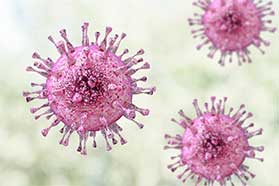Cytomegalovirus Treatment in Kingston, NH
What Is Cytomegalovirus?

Cytomegalovirus, or CMV, is a common virus spread through direct contact with bodily fluids, such as blood and saliva. According to the Centers for Disease Control and Prevention (CDC), one in three children are infected with CMV by age 5 and, by age 40, over half of all U.S. adults will be affected by the virus. Once an individual becomes infected, the virus stays in the body for life and goes through periods of dormancy and reactivation.
In healthy individuals, the cytomegalovirus is most often asymptomatic and goes undetected. However, CMV can cause serious health problems in people with weak immune systems or in babies that have been infected with CMV before they were born, known as congenital CMV.
Although there is no cure for CMV, medications are available to treat those infected. To schedule a consultation with a healthcare practitioner in Kingston who specializes in cytomegalovirus treatment, call (207) 536-9661 or contact Vibrant Health Naturopathic Medical Center online.
Cytomegalovirus Causes

The virus associated with CMV is also closely related to the viruses that cause chickenpox and mononucleosis. It is spread through contact with bodily fluids from an infected person, including blood, saliva, urine, breast milk, semen, and vaginal fluids.
Less often, a CMV infection is spread through an organ transplant, blood transfusion, or an infected mother passing the virus to her unborn child through the placenta from the mother's blood. CMV cannot be transmitted through casual contact.
Cytomegalovirus Symptoms
Most people infected with CMV experience very few signs or symptoms. In healthy individuals, a mild infection may produce the following CMV symptoms:
- Fever
- Fatigue
- Sore throat
- Swollen glands
- Muscle aches
Individuals with low immunity, such as people infected with HIV, cancer, or organ transplant patients, may experience more serious symptoms that affect different organs in the body, including:
- Eyes (CMV retinitis)
- Lungs (pneumonia)
- Liver (hepatitis)
- Stomach (colitis)
- Esophagus (esophagitis)
- Brain (encephalitis)
Babies with congenital CMV tend to be sick at birth and may demonstrate the following cytomegalovirus symptoms:
- Low birth weight
- Jaundice (yellow skin or eyes)
- Deafness
- Poor liver function
- Purple rashes on the skin
- Seizures
- Pneumonia
Diagnosing a CMV Infection
An active CMV infection is diagnosed with a blood test, which determines if CMV antibodies IgM and IgG are present in the blood. Additional laboratory evaluations, including collecting bodily fluid or tissue samples, may be necessary to arrive at a definitive diagnosis.
In pregnant women, a prenatal test called an amniocentesis can help determine whether the fetus has the infection. An amniocentesis is a procedure that removes a small sample of amniotic fluid for testing, and can also determine if a baby has a chromosomal or genetic disorder, among other complications.
CMV Treatment
For healthy children and adults, CMV treatment is typically unnecessary as the infection resolves on its own. If a CMV infection produces mild to moderate symptoms, natural treatment options can be utilized to boot the immune system's response, decreasing the duration and severity of the infection. Cytomegalovirus natural treatment can also keep the virus in its dormant stage.
These natural options include:
- L-lysine: an amino acid that suppresses viral replication
- Probiotics: supplementing with good bacteria can help boost immunity
- Garlic: garlic contains compounds that boost the immune system and provide anti-viral activity
- Vitamin D: helps boost the immune system
- Zinc: boosts the immune system and helps fight infections
- Goldenseal extract: the compounds in this botanical help fight viral infections
For newborns and those with a compromised immune system, CMV is typically addressed with anti-viral medications. For people with HIV or AIDS, drugs used to treat HIV infections are prescribed. People who have had an organ transplant are often given anti-viral drugs to prevent a CMV infection.
CMV Prevention
Practicing good hygiene is the best way to prevent spreading and contracting the cytomegalovirus. Such precautions include:
- Washing hands often throughout the day with soap and water, particularly after frequenting public places
- Avoiding contact with tears and saliva when you kiss a child, particularly avoiding lip contact if you are pregnant
- Avoiding sharing glasses or kitchen utensils
- When disposing of diapers, tissues, or other items that have been contaminated with bodily fluids, avoid touching your face and wash your hands immediately
- Disinfecting frequently touched items, such as toys, countertops, remote controls, keyboards, and doorknobs.
- Practicing safe sex by wearing a condom
A CMV infection is quite common and the severity of health risks the virus poses depends greatly on the health of your immune system. If you or your child experience severe symptoms, it is important to meet with a healthcare practitioner promptly. To schedule an appointment with a practitioner in Kingston who can administer a CMV test and provide effective treatment and prevention options, call (207) 536-9661 or contact Vibrant Health Naturopathic Medical Center online.
Vibrant Health Naturopathic Medical Center
Address
3 Riverside DriveGreenland, NH 03840
(207) 536-9661
www.vibranthealthnaturalmedicine.com
Hours
Mon:
8:30 am - 5:00 pm
Tue:
9:00 am - 5:00 pm
Wed:
10:30 am - 5:00 pm
Thu:
9:00 am - 5:00 pm
Fri:
10:00 am - 4:00 pm
Sat:
Closed
Sun:
Closed

